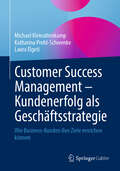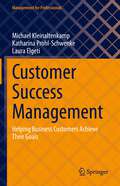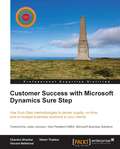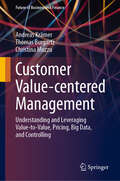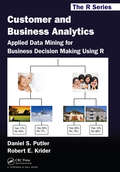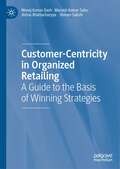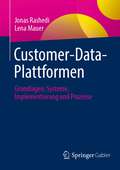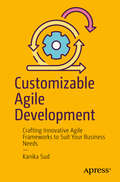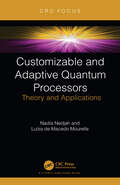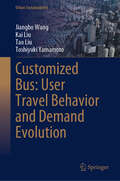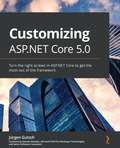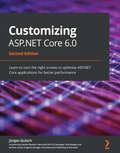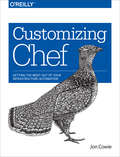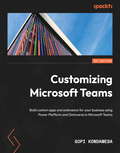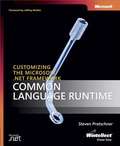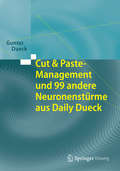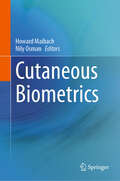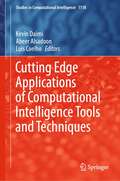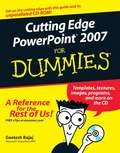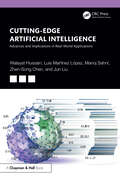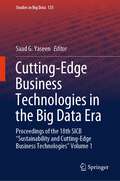- Table View
- List View
Customer Service Over the Phone: Techniques and Technology for Handling Customers Over the Phone
by Stephen CosciaExceptional customer service is crucial to a successful phone-based business. Quality service can secure customer loyalty, while poor service can lose it. This concise guide examines various important scenarios that a customer service representative is likely to encounter and shows how to best handle each situation. This guide also explains how to make effective use of voice mail, email, fax, and letters.
Customer Success Management – Kundenerfolg als Geschäftsstrategie: Wie Business-Kunden ihre Ziele erreichen können
by Michael Kleinaltenkamp Katharina Prohl-Schwenke Laura ElgetiEnde 2024 gaben fast 250.000 Personen auf LinkedIn an, eine Position als Customer Success Manager zu bekleiden. Customer Success Management (CSM) ist somit die am schnellsten wachsende Unternehmensfunktion. Zunächst in ausgewählten Dienstleistungsunternehmen implementiert, verbreitet sich CSM inzwischen weltweit und branchenübergreifend vor allem in Unternehmen, die serviceorientierte Lösungen anbieten bzw. die sich durch komplexe Angebote auszeichnen. Trotz der Praxisrelevanz herrscht vielfach immer noch Unklarheit darüber, was Kundenerfolg ist und wie er von der Anbieterseite aus gemanagt werden kann. Dieses Buch vermittelt Praktikern einen profunden Überblick über CSM auf der Basis von anschaulich aufbereitetem Wissen aus Wissenschaft und Praxis. Die AutorInnen stellen einen praktischen Leitfaden zur Verfügung, der den CSM-Prozess sowie die Rollen, notwendigen Fähigkeiten und Erwartungen an Customer Success Manager umfasst. Darüber hinaus wird aufgezeigt, wie sich CSM von bestehenden kundenbezogenen Managementkonzepten wie Value Based Selling, Key Account Management und Customer Relationship Management unterscheidet und gleichzeitig zu diesen in Beziehung steht. Der Inhalt Customer Success Management: Der Aufstieg eines neuen Managementkonzepts.-Kundenerfolg aus einer zielorientierten Perspektive.- Treiber der Implementierung von CSM.- Value-based Selling.- Implementierung und Onboarding.- Kundenbezogene CSM-Aktivitäten.- Anpassung der Value Proposition und Renewals.- Customer Advocacy. Ergebnisse des Einsatzes von CSM.- CSM-Strukturen
Customer Success Management: Helping Business Customers Achieve Their Goals (Management for Professionals)
by Michael Kleinaltenkamp Katharina Prohl-Schwenke Laura ElgetiEnd of 2022, nearly 200,000 people indicated holding a position as a customer success manager on LinkedIn. Customer success management (CSM) is thus the fastest growing business function. It was first implemented in selected service businesses, but currently CSM applications are spreading globally across industries. This book provides a clear understanding of CSM for practitioners based on comprehensibly prepared knowledge from practical and scientific resources. The book can be used as a practical guide to learn about CSM process and the roles, necessary capabilities, and expectations toward customer success managers. Furthermore, it also shows how CSM differs from and, at the same time, relates to existing customer-related management concepts such as value-based selling, key account management and customer relationship management. The presented insights are not only relevant for customer success managers, but also for those aiming at such a position in the future. The book is also useful for supplier and customer representatives who are connected with customer success management activities in their daily business.
Customer Success with Microsoft Dynamics Sure Step
by Chandru Shankar Vincent Bellefroid Nilesh Thakkar"Customer Success with Microsft Dynamics Sure Step" is a focused tutorial of Microsoft Dynamics solution envisioning and delivery, rather than a step-by-step guide into project management. It will equip you with the tactics required to plan, align, and orchestrate your solution selling activities, as well as help you to be efficient, proactive, goal driven, and flexible in your Microsoft Dynamics engagements. If you are involved in one or more of the roles stated below, then this book is for you: *If you are a Project Manager, Engagement Manager, Solution Architect, or Consultant involved in delivering Microsoft Dynamics solutions, this book will teach you how you can improve the quality of your implementation with a consistent, repeatable process. *If you are a Customer Project Manager, Subject Matter Expert, Key User, or End User involved in selecting the right business solution for your organization and delivering the Microsoft Dynamics solution, this book will help you determine how the method facilitates the delivery of a solution that is aligned to your vision. *If you are a Sales Executive, Services Sales Executive, Technical Sales Specialist, Pre-Sales Consultant, or Engagement Manager involved in the sales of Microsoft Dynamics solutions, this book will help you to understand how you can accelerate your sales cycle and bring it to a close. *If you are the Customer Decision Maker, CxO, Buyer, or Project Manager who participates in the selection process for your business solution needs, this book will show you how to determine how this process can help your due diligence exercise and set the stage for a quality implementation of the solution. *If you are a Change Management expert, this book will enable you to learn how you can help the customer manage organizational change during the business solution delivery process, and/or help solution providers adopt a process for selling and delivering solutions.
Customer Value-centered Management: Understanding and Leveraging Value-to-Value, Pricing, Big Data, and Controlling (Future of Business and Finance)
by Andreas Krämer Thomas Burgartz Christina MuzzuThis book explores Customer Value-centered Management as a modern corporate approach, emphasizing its dual nature: data-driven yet comprehensive. Facing heightened time pressure and uncertainty, management grapples with decision-making challenges amidst VUCA conditions. While complexity rises, tools like big data and AI offer decision-making solutions. Customer centricity, epitomized by Amazon's success, emerges as pivotal, with customer value serving as the linchpin in relationship marketing. Authors advocate an integrated "value-to-value segmentation" approach, reconciling customer and company perspectives. They caution against simplistic interpretations of value-based pricing, stressing the need for holistic consideration of customer benefit, pricing, and costs.
Customer and Business Analytics: Applied Data Mining for Business Decision Making Using R
by Daniel S. Putler Robert E. KriderCustomer and Business Analytics: Applied Data Mining for Business Decision Making Using R explains and demonstrates, via the accompanying open-source software, how advanced analytical tools can address various business problems. It also gives insight into some of the challenges faced when deploying these tools. Extensively classroom-tested, the tex
Customer-Centric Marketing
by Jon James Neil Richardson Neil KelleyTwo of the major parallel challenges facing businesses today are how to adapt to the changes of fast-paced, fragmenting markets and how to grow a business whilst engaging in recognisably sustainable practices. It is not enough to just be sustainable, it is about communicating it and getting the customer involved in the message. Customer-Centric Marketing shows readers how sustainable development practices and digital marketing techniques work naturally together to add value, leading to improved customer satisfaction, better professional relationships and increased effectiveness.Ideal for senior marketing professionals and students on digital marketing or marketing strategy modules who wish to utilise the benefits of sustainable development and forms of digital marketing, this accessible and straight to-the-point book uses case studies to show how the marketing theories and tools work in actual business scenarios. Customer-Centric Marketing covers contemporary issues such as the increasing use of mobile, QR codes and social network sites for consumers interested in ethical, environmental and sustainable marketing.
Customer-Centricity in Organized Retailing: A Guide to the Basis of Winning Strategies
by Manoj Kumar Dash Jishnu Bhattacharyya Manash Kumar Sahu Shivam SakshiThis book provides a compendium of cutting-edge knowledge for an efficacious retailing strategy, with lessons from the organized retailing sector in India. It explores customer needs and their impact on developing successful retailing strategies and organized retailing in emerging economies with changing consumer behavior. It discusses the importance of developing appropriate retailing strategies in the context of an emerging economy, being agile and forward-thinking to implement a customer-centric approach across the retail value chain's upstream and downstream actions, and the requirement of clarity on the exact tools and techniques that will allow the retailers to move from their present product-centric state to the looked-for customer-centric state.This book aids the practitioners in developing and adopting a culture of customer-centricity and focuses on various retail strategy concepts and their implementation. It aims to present the multifaceted and multifarious questions of retail marketing in two studies, where each study provides a comprehensive solution.
Customer-Data-Plattformen: Grundlagen, Systeme, Implementierung und Prozesse
by Jonas Rashedi Lena MauerDieses Buch beantwortet grundlegende Fragen zu CDP, gibt einen Überblick über aktuelle CDPs und identifiziert deren Vorteile und Schwachstellen. Zudem setzt es sich mit unterschiedlichen Entwicklungen im Marketingumfeld auseinander, die starke Treiber für den Einsatz einer Customer-Data-Plattform (CDP) sind. Marketing-Entscheider sowie Verantwortliche aus den Bereichen Online-Marketing und E-Commerce erhalten Tipps, wie die passende CDP ausgewählt und implementiert werden kann. Zudem ist dieses Buch interessant für alle Entscheider, die sich damit beschäftigen, wie sie ihren Konsumenten ein besseres Kauferlebnis bieten können. Dabei geht Jonas Rashedi nicht nur auf die technischen Aspekte ein, sondern beleuchtet auch die organisationsbezogenen Voraussetzungen für die erfolgreiche Implementierung und Verwendung einer CDP. Praxisbeispiele veranschaulichen die Inhalte.This book offers an excellent introduction to the CDP category. I recommend it for anyone trying to understand what CDPs do, whether a CDP is right for their company, and how to select the right CDP.David M. Raab, Gründer und CEO des CDP Institutes
Customizable Agile Development: Crafting Innovative Agile Frameworks to Suit Your Business Needs
by Kanika SudThe one-size-fits-all approach to Agile project management doesn't always fit an organization's needs. This book seeks to highlight the importance of experimentation and customization in modern project management practices. In an era of digital transformation and rapid disruption, organizations must continuously strive to innovate and tailor their methodologies in order to thrive. You'll start by looking at key fundamentals and challenges, setting an agile mindset to then explore the basics of Agile, Scrum, Kanban, and Lean. Aided by practical examples and real-world case studies. you'll then move onto the more practical part of the book and can create customizable Agile frameworks using innovative practices and hybrid models to suit individual needs. With Customizable Agile Development as your guide, you'll be confident in how to adapt and create agile methodologies and frameworks that truly fit your requirements and needs. What You Will Learn Adapt Agile practices to their specific industry and context. Foster a culture of experimentation and continuous improvement. Create Agile frameworks that optimize efficiency and value delivery. Harness Agile methodologies to stay ahead in a rapidly changing world. Who This Book Is For Agile coaches and practitioners as well as product managers and strategy advisors
Customizable and Adaptive Quantum Processors: Theory and Applications
by Nadia Nedjah Luiza De Macedo MourelleThe book describes state-of-the-art advances in simulators and emulators for quantum computing. It introduces the main concepts of quantum computing, defining q-bits, explaining the parallelism behind any quantum computation, describing measurement of the quantum state of information and explaining the process of quantum bit entanglement, collapsed state and cloning. The book reviews the concept of quantum unitary, binary and ternary quantum operators as well as the computation implied by each operator. It provides details of the quantum processor, providing its architecture, which is validated via execution simulation of some quantum instructions.
Customized Bus: User Travel Behavior and Demand Evolution (Urban Sustainability)
by Kai Liu Tao Liu Toshiyuki Yamamoto Jiangbo WangThis book presents a groundbreaking examination of the intricate dynamics shaping the customized bus (CB) service industry. Through a meticulous exploration segmented into three distinct parts, this book offers a holistic approach by dissecting the foundational elements, user behaviors, and environmental influences that collectively drive the success or failure of CB services. The authors employ a multidisciplinary lens, blending empirical research with theoretical insights to unpack the complexities of demand evolution and user loyalty within the CB service sector. This novel approach integrates statistical analyses, user behavior modeling, and environmental effects assessment to provide a comprehensive view of the industry's current state and future prospects. Setting this work apart is its emphasis on the interplay between service provider strategies and the built environment effects, a relatively unexplored dimension in transportation studies. The book introduces pioneering models for understanding user choice behavior and loyalty, considering the heterogeneity of individual preferences and the significant impact of urban built environment. Covering a range of topics from the basic role of CB in transportation systems to advanced analyses of subscribing behavior and market adaptation strategies, the book is designed for a diverse audience. Academics, industry professionals, urban planners, and policymakers will find its content accessible and applicable, with insights beneficial for both introductory learners and advanced practitioners. Strategic Recommendations: Through its analytical rigor, the book equips stakeholders with practical strategies to enhance service viability, promote user loyalty, and navigate the operational complexities of the CB service landscape.
Customizing ASP.NET Core 5.0: Turn the right screws in ASP.NET Core to get the most out of the framework
by Jurgen Gutsch Damien BowdenA guide to discovering the hidden behaviors of ASP.NET Core that can be customized to optimize your .NET 5 applicationsKey FeaturesCustomize the default behavior of ASP.NET Core to get the most out of the frameworkEnhance the app configuration, change the default dependency injection, and build your own tag helpersDiscover best practices for configuring ASP.NET Core, from user interface design to hosting it on platformsBook DescriptionASP.NET Core is the most powerful Microsoft web framework. Although it's full of rich features, sometimes the default configurations can be a bottleneck and need to be customized to suit the nature and scale of your app. If you're an intermediate-level .NET developer who wants to extend .NET Core to multiple use cases, it's important to customize these features so that the framework works for you effectively. Customizing ASP.NET Core 5.0 covers core features that can be customized for developing optimized apps. The customization techniques are also updated to work with the latest .NET 5 framework. You'll learn essential concepts relating to optimizing the framework such as configuration, dependency injection, routing, action filters, and more. As you progress, you'll be able to create custom solutions that meet the needs of your use case with ASP.NET Core. Later chapters will cover expert techniques and best practices for using the framework for your app development needs, from UI design to hosting. Finally, you'll focus on the new endpoint routing in ASP.NET Core to build custom endpoints and add third-party endpoints to your web apps for processing requests faster. By the end of this application development book, you'll have the skills you need to be able to customize ASP.NET Core to develop robust optimized apps.What you will learnExplore various application configurations and providers in ASP.NET Core 5Understand dependency injection in .NET and learn how to add third-party DI containersDiscover the concept of middleware and write your own middleware for ASP.NET Core appsCreate various API output formats in your API-driven projectsGet familiar with different hosting models for your ASP.NET Core appDevelop custom routing endpoints and add third-party endpointsConfigure WebHostBuilder effectively for your web applicationsWho this book is forThis .NET 5 book is for .NET developers who need to change the default behaviors of the framework to help improve the performance of their applications. Intermediate-level knowledge of ASP.NET Core and C# is required before getting started with the book.
Customizing ASP.NET Core 6.0: Learn to turn the right screws to optimize ASP.NET Core applications for better performance, 2nd Edition
by Jurgen Gutsch Damien BowdenExplore hidden behaviors and customization techniques to help you get the most out of ASP.NET Core for building web applicationsKey FeaturesSecond edition updated and enhanced to cover the latest .NET 6 features and changesLearn expert techniques to implement authentication and authorization for securing your web appsDiscover best practices for configuring ASP.NET Core, from user interface design to hosting it on platformsBook DescriptionASP.NET Core comes packed full of hidden features for building sophisticated web applications. You'd be missing out on a lot of its capabilities by not customizing it to work for your applications. With Customizing ASP.NET Core 6.0, you'll discover techniques to help you get the most out of the framework to deliver robust applications.In this updated second edition, you'll cover the latest features and changes in the .NET 6 LTS version. You'll find new insights and customization techniques for important topics such as authentication and authorization. The book will also show you how to work with caches and change the default behavior of ASP.NET Core apps. You'll learn essential concepts relating to optimizing the framework, such as configuration, dependency injection, routing, action filters, and more. As you progress, you'll be able to create custom solutions that meet the needs of your use case with ASP.NET Core. Later chapters will cover expert techniques and best practices for using the framework for your app development needs, from UI design to hosting. Finally, you'll focus on the new endpoint routing in ASP.NET Core to build custom endpoints and add third-party endpoints to your web apps for processing requests faster.By the end of this book, you'll be able to customize ASP.NET Core to develop robust optimized apps.What you will learnExplore various application configurations and providers in ASP.NET Core 6Enable and work with caches to improve the performance of your applicationUnderstand dependency injection in .NET and learn how to add third-party DI containersDiscover the concept of middleware and write your middleware for ASP.NET Core appsCreate various API output formats in your API-driven projectsGet familiar with different hosting models for your ASP.NET Core appWho this book is forThis .NET 6 book is for .NET developers who need to change the default behaviors of the framework to help improve the performance of their applications. Intermediate-level knowledge of ASP.NET Core and C# is required before getting started with the book.
Customizing Chef
by Jon CowieTake advantage of Chef's highly customizable design to tackle specific automation issues that you can't solve by simply using Chef's tools, resources, and services out of the box. With this practical guide, you'll examine the internal structure of this configuration management technology and learn where, how, and why to add custom code.Author Jon Cowie not only provides code snippets and practical advice for customizing Chef, but also helps you determine case by case whether it's in your best interests to customize at all. If you have intermediate-to-advanced Chef experience, this book is indispensable.Explore Chef's typical setups and why you'd want to customize themLearn the Ruby concepts needed to write customizationsCustomize the Chef run process and explore Chef's internal classesGain more insight into your Chef runs through handlers and Chef's event streamLevel up your Chef recipes by writing your own resources and providersCreate and extend plugins for Knife--Chef's command-line toolInteract with the Chef API to write scripts and reportsLearn how to contribute customizations to the Chef community
Customizing Chef: Getting the Most Out of Your Infrastructure Automation
by Jon CowieTake advantage of Chef’s highly customizable design to tackle specific automation issues that you can’t solve by simply using Chef’s tools, resources, and services out of the box. With this practical guide, you’ll examine the internal structure of this configuration management technology and learn where, how, and why to add custom code.Author Jon Cowie not only provides code snippets and practical advice for customizing Chef, but also helps you determine case by case whether it’s in your best interests to customize at all. If you have intermediate-to-advanced Chef experience, this book is indispensable.Explore Chef’s typical setups and why you’d want to customize themLearn the Ruby concepts needed to write customizationsCustomize the Chef run process and explore Chef’s internal classesGain more insight into your Chef runs through handlers and Chef’s event streamLevel up your Chef recipes by writing your own resources and providersCreate and extend plugins for Knife—Chef’s command-line toolInteract with the Chef API to write scripts and reportsLearn how to contribute customizations to the Chef community
Customizing Microsoft Teams: Build custom apps and extensions for your business using Power Platform and Dataverse in Microsoft Teams
by Gopi KondamedaBuild customized apps quickly using real-world business scenarios and proven techniques with this all-inclusive guide for Microsoft Teams professionalsPurchase of the print or Kindle book includes a free PDF eBookKey FeaturesCustomize and extend Microsoft Teams using Power Apps, Power Automate, SharePoint framework, PowerShell, and Microsoft Graph APIsIntegrate Microsoft-certified third-party and Dynamics 365 apps with Microsoft TeamsUnderstand the low-code capabilities of Microsoft Teams provided by Dataverse for TeamsBook DescriptionIn the evolving remote working arrangement, the demand for custom Microsoft Teams apps is increasing rapidly across businesses. If you are someone who aims to provide users with an exceptional experience through custom-built apps that adhere to industry standards and good governance, Customizing Microsoft Teams is for you!The book starts with an overview of Microsoft Teams customization and configuration prerequisites. It then shows you how to expose functionalities from various solutions through tabs, connectors, messaging extensions, and more before you move on to explore how the PowerShell module can manage multiple aspects of administration and how to use the SharePoint Framework for creating custom Microsoft Teams apps. You'll be able to work with Microsoft Dataverse for Teams to build custom apps, bots, and flows using Power Apps, Power Virtual Agents, and Power Automate. As you publish your production-ready apps on the Teams store and Microsoft AppSource, you'll also understand Teams app analytics and reporting functionalities.By the end of this book, you'll have learned how to develop custom solutions to solve critical business problems and extend the power of Microsoft Teams to develop high-value use cases in the remote working culture.What you will learnUnderstand Microsoft Teams app architecture and configuration for custom appsPersonalize the Teams compose box with your app and develop rich interactive cardsExplore the diverse Teams capabilities using Microsoft Graph APIsManage multiple aspects of Teams administration, including users, policies, and configurationBuild custom apps and bots using Power Apps, Power Virtual Agents, and Power AutomateUse community-driven, open source app templates for Microsoft Teams extensibilityPublish your app on Microsoft AppSource for global subscribersWho this book is forIf you are a business user, Microsoft Teams developer, citizen developer, or Microsoft Teams admin working with Microsoft 365 apps and want to develop custom solutions with Microsoft Teams for multiple business use cases, this book is for you. It is recommended that you have a fundamental understanding of Microsoft 365 technologies to fully benefit from this book.
Customizing the Microsoft® .NET Framework Common Language Runtime
by Steven PratschnerPacked with expert guidelines and advice, this is the advanced reference you need to customize common language runtime (CLR) applications now--and as you move to Microsoft .NET Framework 2.0 and Microsoft Visual Studio 2005. Microsoft program manager Steven Pratschner takes you inside the workings of the CLR, showing you how it functions, and how to tailor its features for the unique requirements of your application. You'll go from configuring basic startup parameters to controlling critical runtime notations--including how code is loaded into the process, how memory is managed, and when code is scheduled to run. Find the detailed information and insights you need--and take full advantage of the increased flexibility and programmability of the CLR. Discover how to: Write your own CLR host--or customize the default host--to control startup and shutdown Use application domains and domain managers to effectively isolate groups of assemblies Learn key strategies for loading and customizing assemblies in extensible applications Extend and customize the Code Access Security (CAS) system to help protect your extensible application Unload a domain without leaking resources--and make code more reliable--using safe handles, critical finalizers, and constrained execution regions Use the host protection feature for application-specific programming model constraints Create and manage tasks with custom schedulers and thread pools Covers Microsoft .NET Framework 2.0 Get code samples on the Web: For information on code samples and system requirements, please see the Introduction.
Cut & Paste-Management und 99 andere Neuronenstürme aus Daily Dueck
by Gunter DueckSeit 2005 schreibt der Bestsellerautor Gunter Dueck auf seiner Hompepage alle 14 Tage ein neues "Daily Dueck". Mehr als inzwischen 10. 000 Stammleser finden dort Satirisches, Ergötzliches oder auch herb Kritisches. Dieser Band enthält als "zweite Staffel" die "Daily Duecks" Nummer 100 bis 199 für diejenigen, die lieber ein Buch in den Händen halten oder versäumtes Lesen nachholen möchten. Hier finden Sie viel satirisch-ätzende Managementkritik, Aufrufe zu mehr Bildung und Innovation, politische Grundsatzkommentare bis hin zu Ärger über die NSA. (Die ersten 99 Daily Duecks erschienen unter dem Titel "Platons grotesker Irrtum". )
Cutaneous Biometrics
by Howard Maibach Nily OsmanThis handbook covers the essential subject areas of cutaneous biometrics, including acne, aging, genetics, eczema, psoriasis, atopic dermatitis, rosacea, wound healing, and more. Erythema of rosacea and the risk of skin ulceration associated with oral nicorandil therapy are covered in detail. Various areas of acne are addressed, including acne severity grading, the assessment of general health and quality of life in patients with acne, and the effect of automated online counseling on clinical outcomes and quality of life among adolescents with acne vulgaris. Other topics include the development and validation of a clinical scale for the evaluation of forearm skin photoaging and a scoring system for mucosal disease severity. This is an ideal reference for biomedical engineering researchers and clinicians working in the field of dermatology interested in a deeper understanding of cutaneous biometrics and how it can be applied to their work. This book also: Broadens reader's understanding of the importance of creating meaningful dermatological patient outcome measurements and the use of the physician global assessment in a clinical setting to measure and track patient outcomes Details the guidelines on the measurement of ultraviolet radiation levels in ultraviolet phototherapy
Cutaneous Haptic Feedback in Robotic Teleoperation (Springer Series on Touch and Haptic Systems #0)
by Claudio PacchierottiThis work addresses the challenge of providing effective cutaneous haptic feedback in robotic teleoperation, with the objective of achieving the highest degree of transparency whilst guaranteeing the stability of the considered systems. On the one hand, it evaluates teleoperation systems that provide only cutaneous cues to the operator, thus guaranteeing the highest degree of safety. This cutaneous-only approach shows intermediate performance between no force feedback and full haptic feedback provided by a grounded haptic interface, and it is best suitable for those scenarios where the safety of the system is paramount, e. g. , robotic surgery. On the other hand, in order to achieve a higher level of performance, this work also investigates novel robotic teleoperation systems with force reflection able to provide mixed cutaneous and kinesthetic cues to the operator. Cutaneous cues can compensate for the temporary reduction of kinesthetic feedback necessary to satisfy certain stability conditions. This state-of-the-art volume is oriented toward researchers, educators, and students who are interested in force feedback techniques for robotic teleoperation, cutaneous device design, cutaneous rendering methods and perception studies, as well as readers from different disciplines who are interested in applying cutaneous haptic technologies and methods to their field of interest.
Cutting Edge Applications of Computational Intelligence Tools and Techniques (Studies in Computational Intelligence #1118)
by Kevin Daimi Abeer Alsadoon Luis CoelhoThe book delivers an excellent professional development resource for educators and practitioners on the cutting-edge computational intelligence techniques and applications. It covers many areas and topics of computational intelligence techniques and applications proposed by computational intelligence experts and researchers and furthers the enhancement of the community outreach and engagement component of computational intelligence techniques and applications. Furthermore, it presents a rich collection of manuscripts in highly regarded computational intelligence techniques and applications topics that have been creatively compiled. Computers are capable of learning from data and observations and providing solutions to real-life complex problems, following the same reasoning approach of human experts in various fields. This book endows a rich collection of applications in widespread areas. Among the areas addressed in this book are Computational Intelligence Principles and Techniques; CI in Manufacturing, Engineering, and Industry; CI in Recognition and Processing; CI in Robotics and Automation; CI in Communications and Networking; CI in Traditional Vehicles, Electric Vehicles, and Autonomous Vehicles; CI in Smart Cities and Smart Energy Systems; and CI in Finance, Business, Economics, and Education. These areas span many topics including repetitive manufacturing, discrete manufacturing, process manufacturing, electronic systems, speech recognition, pattern recognition, signal processing, image processing, industrial monitoring, vision systems for automation and robotics, cooperative and network robotics, perception, planning, control, urban traffic networks control, vehicle-to-roadside communications, smart buildings, smart urbanism, smart infrastructure, smart connected communities, smart energy, security, arts, and music.
Cutting Edge PowerPoint 2007 For Dummies
by Geetesh BajajGet ready to add punch and pizzazz to your presentations and wow your audience using the latest PowerPoint techniques. This friendly book/CD-ROM combo covers all of the new features of Microsoft PowerPoint 2007, including interface changes, presentation themes, multimedia, the Slide Library, and more. The guide introduces you to the elements of PowerPoint: text; background, images, and info-graphics; shapes; fills, lines, and effects; sound and video; animations and transitions; and interactivity, flow, and navigation. Packed with numerous tips, shortcuts, workarounds, and timesaving techniques, it shows you step-by-step how to:Dress up your text by using fonts creatively and using WordArt to create artistic effectsWork with masters and layouts, templates and themes, and fills, lines, and effectsMaximize visual appeal by combining Photoshop with PowerPointAdd transitions, photos, motion, sound (narration and music), video, and animationUse SmartArt to create diagramsCreate dynamic charts, equations, maps, and moreUse PowerPoint's extensive clip art collectionTest and set up your presentationLink to Flash, Acrobat, Word, and ExcelPrint presentation materials and create helpful handoutsThe CD includes templates, textures, backgrounds, background music scores, images, alpha channel equipped graphics, maps, illustrations, and more, so this combo gives you the know-how and the tools. An 8-page color insert shows you how to use color effectively. With this friendly guide, you're ready to bring your presentation to life with PowerPoint 2007.Note: CD-ROM/DVD and other supplementary materials are not included as part of eBook file.
Cutting-Edge Artificial Intelligence Advances and Implications in Real-World Applications
by Jun Liu Manoj Sahni Walayat Hussain Luis Martínez López Zhen-Song ChenArtificial intelligence (AI) is impacting industries worldwide by introducing new methods and altering traditional practices. This book examines AI’s diverse effects, providing insights into its applications, challenges, and future prospects across education, healthcare, finance, and more.The chapters explore how AI technologies, such as large language models, enhance feedback in higher education and influence legal studies while upholding academic integrity. A review of key technical approaches—knowledge-based systems, machine learning, and intelligent optimization—lays the groundwork for understanding AI’s potential. Real-world examples illustrate AI’s role in medical imaging, presenting new diagnostic methods and the use of language models for image interpretation. The book also discusses financial applications, including techniques for credit card fraud detection and forecasting natural gas prices using innovative models. Additionally, it covers personalized federated learning models, highlighting the importance of data privacy and security in AI’s evolution.This comprehensive guide is valuable for educators, researchers, practitioners, and students interested in AI’s current and future developments. By combining theory with practical examples, the book offers readers a clear understanding of how AI affects various sectors, enabling them to engage effectively with this rapidly evolving field.
Cutting-Edge Business Technologies in the Big Data Era: Proceedings of the 18th SICB “Sustainability and Cutting-Edge Business Technologies” Volume 1 (Studies in Big Data #135)
by Saad G. YaseenThis book highlights applied artificial intelligence techniques, tools, and systems to drive strategic advantages, improve operational efficiency, and create added value. The focus is very much on practical applications and how to maximize the value of these technologies. They are being applied across businesses to enhance innovation, improve performance, increase profit, support critical thinking, and ultimately create customer-added value. Whether you are a researcher, manager, or decision-maker, this book provides valuable insights to help you harness the power of AI and big data analytics in your organization. This book attempts to provide answers to the most important questions: Quo Vadis applied artificial intelligence? Quo Vadis cutting-edge business technologies?

